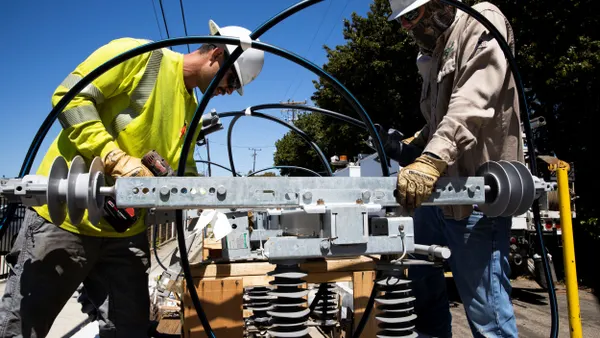Dive Brief:
- PacifiCorp and several other stakeholders have reached an agreement allowing the utility's 2017 transportation electrification program to go forward, including spending almost $2 million to own charging stations.
- While the settlement has broad support, charging station developer ChargePoint has filed its opposition to the plan. The company says it believes the plan opposes the design principles that PacifiCorp will use in its plan because it does not meet state law, the company told Utility Dive in an email.
- PacifiCorp and Portland General have both filed plans to expand EV charging infrastructure in the state in response to a law passed last year that also directed the phaseout of coal-fired generation and raised the state's renewables goal.
Dive Insight:
EV programs proposed by PacifiCorp and Portland General are relatively small, with capital expenses of $2.6 million and $1.85 million, respectively. But ChargePoint claims that despite their size, the programs are inappropriate because the utilities are not allowed to own the stations
"The Commission should reject the stipulation’s request for approval of Pacific Power’s proposed public charging program," ChargePoint wrote in its filing last week, referring to PacifCorp's subsidy, Pacific Power. The program does not meet the criteria of the state's law, SB 1547, the company argued.
"Pacific Power seeks the Commission’s authorization to 'pilot' the public charging model because it hopes to expand it to a full-fledged program in the future," the company told regulators. "However, even the Stipulating Parties acknowledge that public charging does not meet the requirements of SB 1547, but excuse this failure because they consider Public Charging to be a pilot program."
Pacific Power disputes this point, a spokesman told Utility Dive, saying none of the stipulating parties raised those issues in the stipulation agreement.
In recent years, tension arose in state proceedings over whether utilities should own or ratebase distributed energy resources (DERs). Those debates are still ongoing in states such as California. It appears Oregon is another hotspot, but for different reasons — the way Pacific Power has designed the program, not the ownership itself.
ChargePoint said commission should not the utility to launch a pilot of a business model "that fails to meet the statutory criteria and is therefore not viable as a future program and that would cause significant market distortions in the near term." The agreement, reached between PacifiCorp, PUC staff, Oregon Citizens’ Utility Board, the Industrial Customers of Northwest Utilities, and others, was filed on Aug. 11.
Per the agreement, program expenses will be capped at $1.85 million during the 2017-2019 pilot period. And only the equipment and installation line items in the proposed budget, and a portion of the program administration directly attributable to bringing the charging pods into service will be treated as capital expenses. All other program costs will be treated as operations and maintenance items.
Correction: A previous version of this post incorrectly said ChargePoint opposes utility ownership of charging stations. That is incorrect. The post has also been updated to include Pacific Power's statement.














